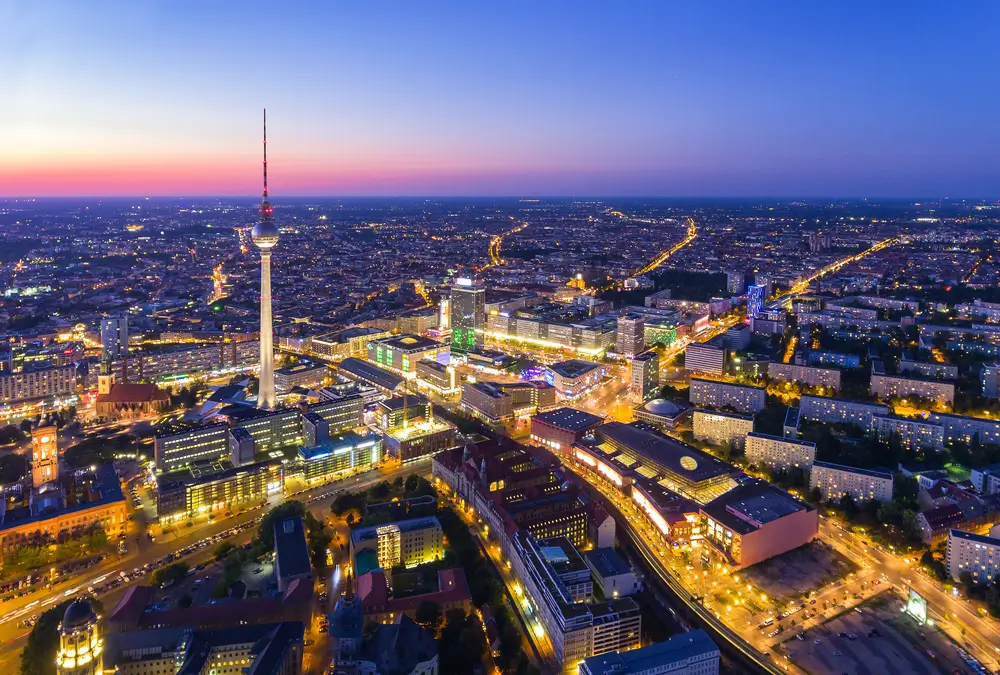Berlin
Berlin Travel Guide

Berlin, a city with rich historical and modern soul, stands as a pillar to the culture and heart of Germany. With its neighborhoods and iconic landmarks, you can hear the echoes of the past along with witnessing the history itself. Staying in Berlin will be like living in a time capsule while the past is improved with technological advancement as if you have time traveled. With its traditional structures in the streets and other landmarks, Berlin wants you to have a great time.
Besides the top Berlin attractions, there will be lots of museums, foods, clubs, and scenes to experience to maximize your trip. Whether you are visiting for a few days or for more, Berlin will know how to welcome you properly. Thanks to its lively summer days or the embrace of winter, you will find everything you either in the main streets or gems hidden in the corners.
Things To Know Before Going To Berlin
- Berlin has an excellent public transportation system of U-Bahn (subway), S-Bahn (metro), buses, and trams.
- Taxis are readily available but can be expensive. Uber operates in Berlin.
- Berlin has many world-class museums covering history, art, science, and more. Some top picks are the DDR Museum about East Germany, the Berlin Wall Memorial, and the Spy Museum.
- Take a free walking tour to get oriented and learn about the city's fascinating history. Bike tours are also a great way to see a lot.
- Explore neighborhoods like Mitte, Prenzlauer Berg, Neukölln, and Charlottenburg which each have their own vibes and attractions.
- Relax at one of Berlin's many lakes and parks like Wannsee, Havel, and Grunewald.
- Berlin is known for its currywurst (curry-flavored sausage). Döner kebabs are also a cheap and tasty option.
- Bakeries like Kamps and Backfactory offer inexpensive breakfast and snack options.
- Germany is famous for its beer. Try some at restaurants in the Sony Center or Mommsen-Eck which has 100 beers on offer.
- Germans are generally friendly and many speak excellent English, especially in tourist areas. However, learning a few German phrases is appreciated.
- Berlin is a very safe city but take normal precautions against pickpockets in crowded areas. Avoid Görlitzer Park unless you want to buy drugs.
- Book your hostel or hotel early as they can fill up, especially in summer. A&O hostels are a cheap option.
- Carry some cash as many places still only accept Euros, especially smaller businesses and bars.
Berlin Tips From Locals
- Mitte is a historic center with many attractions, museums, and government buildings.
- Prenzlauer Berg is known for its trendy cafes, boutiques, and nightlife.
- Neukölln has a diverse, artsy vibe with many bars, clubs, and alternative venues.
- Charlottenburg is an upscale area.
- Visit the East Side Gallery, the longest remaining section of the Berlin Wall covered in murals.
- Check out the flea markets at Mauerpark on Sundays for shopping, food, and live music.
- Relax in one of Berlin's many parks like Tiergarten, Treptower Park, or Volkspark Friedrichshain.
- Take a free walking tour to learn about Berlin's history and see the main sights.
- Try currywurst, a Berlin specialty of sausage with curry ketchup.
- Döner kebabs are a cheap and tasty Turkish fast food.
- Kamps and Backfactory are popular bakery chains for breakfast and snacks.
- Beer gardens like Prater Garten are great for enjoying German beer in the summer.
- Berlin has an excellent public transportation system of U-Bahn, S-Bahn, buses, and trams. Get a transit map and plan your route in advance.
- Stay in a hotel or hostel near a major U-Bahn or tram stop for easy access around the city.
- Carry some cash as many places still only accept Euros, especially smaller businesses and bars.
Where is Berlin?
Berlin is located in northeastern Germany, in an area of low-lying marshy woodlands with a mainly flat topography. It is part of the vast Northern European Plain and is located about 112 miles (180 km) south of the Baltic Sea, 118 miles (190 km) north of the Czech-German border, 110 miles (177 km) east of the former inner German border, and 55 miles (89 km) west of Poland. The city lies at the heart of the North German Plain in the wide glacial valley of the Spree River, which runs through the center of the city.
Where To Stay In Berlin?
Berlin is a large city with many different neighborhoods, each with its unique character and attractions. Here are some of the best areas to stay in Berlin:
District | Best For | Best Attractions | Average Trip Cost |
| Mitte | Central Location History | Brandenburg Gate Museum Island Alexanderplatz | Moderate |
| Kreuzberg | Vibrant Nightlife Artsy Vibe | Street Art Görlitzer Park Landwehr Canal | Budget-Friendly |
| Friedrichshain | Hipster Culture Nightlife | East Side Gallery RAW Gelände Boxhagener Platz | Moderate |
| Charlottenburg | Upscale, Shopping Palaces | Charlottenburg Palace Kurfürstendamm Tiergarten | Higher-End |
| Prenzlauer Berg | Family-Friendly Cafes | Mauerpark Kollwitzplatz Prater Garten | Moderate |
Best Hotels in Berlin
Hotel | District | Affordability | Why To Stay There? |
| Heart of Gold Hostel Berlin | Mitte | Budget | An affordable option in central Mitte. Close to major attractions like Museum Island and Brandenburg Gate. |
| Generator Berlin Mitte | Mitte | Mid-range | Stylish design and comfortable rooms. Proximity to Berlin Wall Memorial and Hackescher Markt. |
| Hotel Adlon Kempinski Berlin | Mitte | Luxury | Iconic luxury hotel with a rich history. Stunning views of the Brandenburg Gate and Tiergarten. |
| Steigenberger Airport Hotel Berlin | Schönefeld | Near Airport | Convenient location near Berlin Schönefeld Airport. Modern amenities and comfortable accommodations. |
Find the best hotels in Berlin!
Places To Visit In Berlin
Thanks to its dynamic history. Berlin has iconic landmarks, such as the Brandenburg Gate and Berlin Cathedral. Take a step into the city's cultural heritage and witness the beauty of it. Here are some must-visit places in Berlin:
- Brandenburg Gate: A symbol of unity and German reunification, the Brandenburg Gate stands as an iconic landmark in Berlin with a rich historical significance.
- Reichstag Building: A historic parliamentary building, the Reichstag has a glass dome offering visitors a captivating panoramic view of Berlin.
- Berlin Cathedral: A grand architectural masterpiece, Berlin Cathedral impresses with its historic charm and cultural significance.
- Museum Island: Housing top-tier museums, Museum Island is a UNESCO World Heritage Site offering a diverse collection of historical and artistic treasures.
- Holocaust Memorial: A significant memorial of the Holocaust Memorial serves as a powerful tribute to the victims of one of history's darkest chapters.
Is Berlin Safe?
Berlin is generally considered a safe city for tourists. Visitors to Berlin usually feel safe, and the city is known for its hospitable atmosphere. However, it is important to take standard precautions, such as keeping an eye on your belongings and being aware of your surroundings, particularly in crowded areas or during peak travel times.
Is Berlin Expensive To Visit?
Berlin is generally considered an affordable city to visit with a wide range of hotel options and activities available at various prices. Hostels in Berlin are the most affordable option. Hotel rates are also pretty good considering that you are in such a city. Food and other city activities are also not that expensive. However, depending on what kind of Berlin trip you want to have, you may spend more or less than you expect.
Berlin Currency
Berlin, like the rest of Germany, uses the Euro as its official currency. There are numerous currency exchanges and banks across the city where money can be exchanged for Euros. However, it is recommended to carry some cash, as debit cards and major credit cards (American Express, Visa, Mastercard) may often be accepted, but smaller shops and cafés might only accept cash payments.
Berlin Language
The official spoken language in Berlin is German. However, Berlin is a multicultural city, and a wide variety of languages are spoken there due to the diverse population. The most commonly spoken foreign languages in Berlin are Turkish, Polish, English, Persian, Arabic, Italian, Bulgarian, Russian, Romanian, Kurdish, Serbo-Croatian, French, Spanish, and Vietnamese. Particularly in tourist areas, English is widely spoken, meaning that you probably won’t have any communication problems during your trip.
Berlin Time Zone
Berlin is located in the Central European Time (CET) zone, which is UTC/GMT +1 hour. Daylight Saving Time (DST) is observed from the last Sunday in March to the last Sunday in October when the time is advanced by one hour.
How Many Days To Visit Berlin?
If you want to see most of the main attractions of Berlin, three days will be enough to visit the city. However, visitors who want to see more of the city's museums, art galleries, and other attractions may want to add a few extra days to their stay. Keep in mind that Berlin is a large city with numerous landmarks, museums, and neighborhoods to discover. So choosing where to stay in Berlin plays a crucial role in your trip.
When Is The Best Time To Stay In Berlin?
The best time to visit Berlin is considered to be between May and September. During this period, the city experiences the most favorable weather with moderate temperatures. This allows for a comfortable exploration of the city. However, this also means that hotel rates will be higher than usual. Hotel rates in Berlin are generally more affordable during the winter months, particularly between January and March because it’s off-peak season in winter. Here is the breakdown of seasons in Berlin:
- Summer (June to August): Average temperatures go over 21°C with long and sunny days. It's the ideal time for street parties, open-air events, and festivals.
- Fall (September to October): An excellent opportunity for visitors to enjoy good weather with fewer crowds. Fall in Berlin is marked by vibrant colors, both in nature and cultural events like Berlin Art Week and the Festival of Lights.
- Spring (March to May): With temperatures rising around 19°C create a mild and comfortable environment. Blossoming flowers will make the city as colorful as ever. It becomes the best time to visit busier streets.
- Winter (December to February): The temperature ranges around and below or around 0°C. Despite the chill, the city's nightlife and arts scene thrive, and Christmas markets add a touch of warmth. It's a cozy time for indoor exploration.
What To Pack For Your Visit To Berlin?
When packing for a visit to Berlin, consider the season and the activities you plan to do.
For summer, pack a hat and sunscreen for protection from the sun, t-shirts, shorts, leggings, comfortable walking shoes, and a light jacket for cooler evenings.
For winter, pack warm clothing such as a hat, gloves, and scarf, comfortable boots, and a warm jacket.
For spring, pack short and long-sleeved shirts, pants, skirts, or dresses, and a jacket for colder days and evenings.
For fall, pack long-sleeved shirts, pants, and a jacket for colder weather.
Berlin Food
Berlin is a city with a unique cuisine that will make you want to eat more and more thanks to its delicate offerings. Here are some of must eat Berlin foods you should try during your visit:
- Currywurst: A fast-food staple consisting of pork sausage and curry powder.
- Königsberger Klopse: Meatballs in a white sauce with capers.
- Wiener Schnitzel: Breaded and fried veal cutlet.
- Eisbein: Pickled ham hock that is cured and boiled, often served with sauerkraut (raw cabbage).
- Döner Kebab: Seasoned chicken cut into thin strips and placed in bread with tomatoes, fries, and other dressings.
- Kartoffelpuffer: Potato pancakes.
- Senfeier: A dish made with sauerkraut and mustard.
Berlin Nightlife
Nightlife in Berlin is considered a world-class party destination. With more than 4,500 bars and clubs in the city, Berlin is home to some of the best nightlife in the world. The city's atmosphere makes it easy for party-goers to loosen up and enjoy the night. From underground clubs to luxury cocktail bars, Berlin has something for everyone. The nightlife areas in Berlin are popular with both locals and visitors. Here are some nightlife spots in Berlin for you to loose up:
Nightclubs:
- Berghain: Known for its unique atmosphere and best electronic music.
- Tresor: A legendary techno club with a raw and industrial vibe.
- Sisyphos: Offers a diverse music program and a sprawling outdoor area.
- Watergate: Known for its stunning views of the Spree and top-notch electronic music.
- KitKat: A popular club with a liberal atmosphere and various themed parties.
Bars:
- Room 4 Resistance: A club that highlights the work of non-white, queer, non-binary, and transgender artists.
- Trauma Bar und Kino: Known for its revolutionary spirit and diverse musical influences.
- Salon zur Wilden Renate: Offers a unique and creative party experience.
- Kater Blau: Known for its vibrant and inclusive atmosphere.
- Club der Visionaere: A riverside club with a laid-back and friendly vibe.

